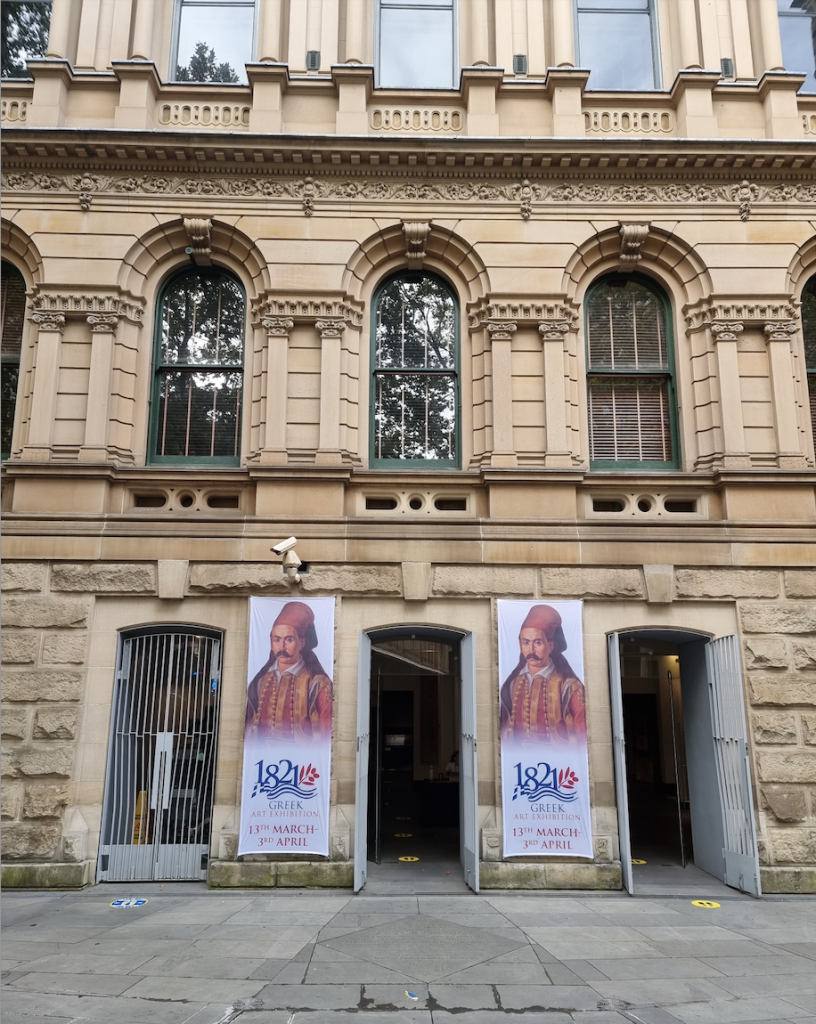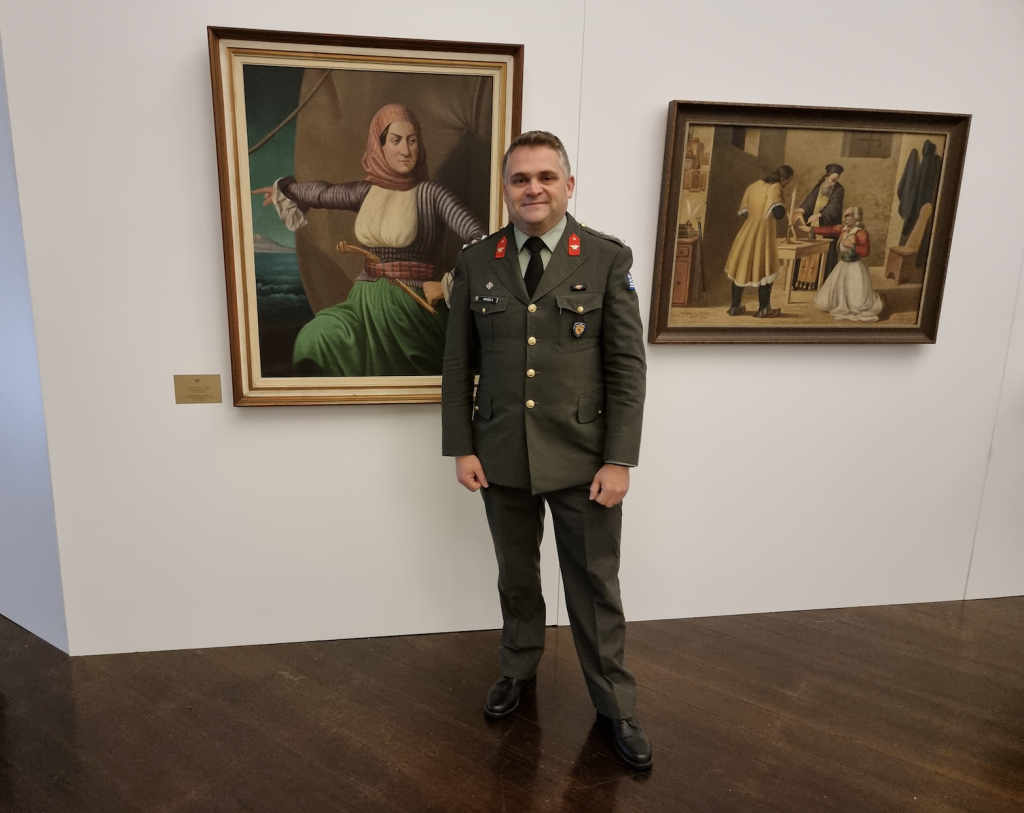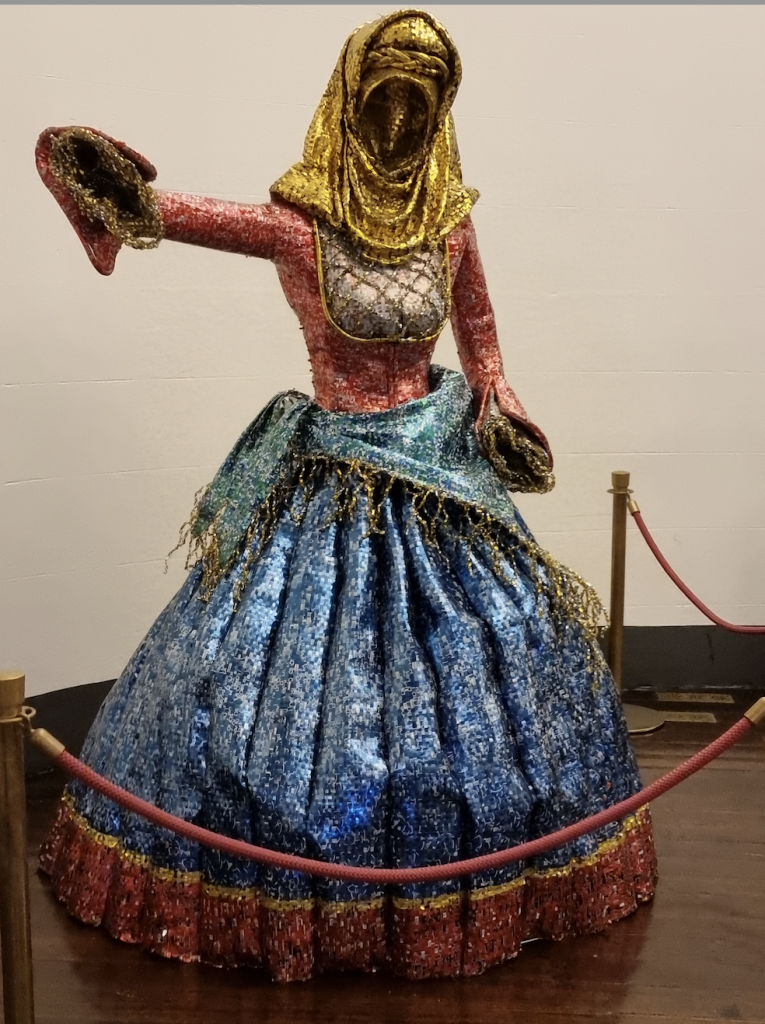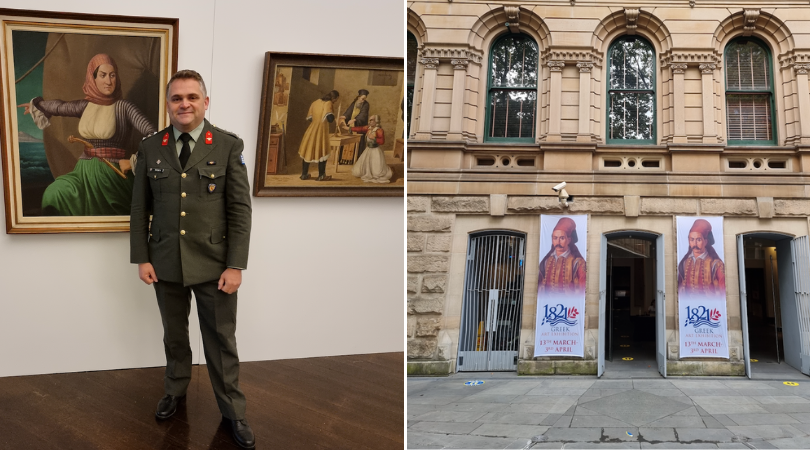By Ikaros Kyriakou
The exhibition-tribute to the revolution of 1821, presented for the first time in Australia by St Basil’s in collaboration with the War Museum of Greece, is proving to be a huge success, receiving rave comments and visiting traffic skyrocketing.
The rare exhibition is hosted at Sydney’s historic Town Hall and along with artworks from the Greek Revolution of 1821, from the War Museum of Greece, it also presents traditional Greek costumes from the impressive collection “Heroes of metal” by internationally renowned sculptor Nikos Floros.
The exhibition is presented for the first time in Australia and has the primary purpose of glorifying the ideal of freedom, which is so afflicted nowadays.

We visited the exhibition and had the opportunity to talk with Captain Nikolaos Roussos, who serves at the War Museum of Athens. He has studied museology and art conservation and his specialty is curator of museum collections.
“In principle I would like to thank all the operators involved for bringing this exhibition to faraway Australia. I am very happy because I have not yet realised that I am out of Greece, even though I have been in Australia for 10 days. The hospitality is so warm here and the exhibition has been embraced by Greeks and Australians”, says Captain N. Roussos.
“We started together with St Basils with the blessings of His Eminence Archbishop of Australia Mr. Makarios. Together with Mr. George Koromvokis we prepared this Exhibition. We also collaborated with the Greek sculptor Nikos Floros, who has brought us his creations that have been made from tins of soft drinks and we have brought exhibits that come from the Athens War Museum. In short, they were removed from the museum grounds, packed and transported to Sydney for the first time. It is also the first time that they go outside the War Museum outside Europe,” he stressed.

We asked him how easy or difficult it was to transport all these exhibits to Sydney.
“Because it was the first time and with the restrictions due to Covid, it was quite difficult to transport the exhibits. But the final result makes us happy because we managed to bring these objects here, and people come to admire them.
“I cannot describe my feelings when I see elderly people crying when we show them around the exhibition, telling us their own stories and spontaneously declaring: “you have finally come here to tell us a few words about our history.”
“I tell them that we have not forgotten them, and that with this exhibition we awake a lot of memories,” said Captain Roussos.
E.K.: The Exhibition has been open for a few days. What was the response of our community.
“The exhibition has been visited so far by more than a thousand people, although it was opened only a few days ago. I notice that visitors love it, even Australians who do not know Greek history, however they come and are interested to know what this occupation from the Ottoman Empire was, and ask how many years it lasted. In fact, when we tell them that the occupation lasted 400 years, they express their admiration and say, “have you endured so many years and been able to be liberated after four centuries?”
“I tell them: “We had faith in God. Those who fought gave what fortunes they had with the sole aim of liberating our homeland”.

E.K.: How important is this Exhibition for the 2nd and 3rd generation of Greek Australians?
“I think it is very important because the 1st generation has given something to the 2nd. The 2nd to 3rd slowly began to dwindle. But it is very important because we awake memories of Greece, we tell them who our ancestors were, we show them what our ancestors did for us, something similar that those who are here in Australia do for Greece. Many of them are great benefactors who have offered much to Greece, just like the Philhellenes in those years.
“The Philhellenes when they saw the Greeks rebelling and doing something good for the interest of their country, recognized that they should be helped. From that point on, English, French, Russians, Spaniards, etc. followed their example. who rushed to provide a helping hand to Greece.
“In a way this is also the case today with expats. They see Greece facing some economic hardship, having some trouble from earthquakes or fires. Diaspora is always on the side of Greece”.
E.K.: The International Artist Nikos Floros had stated: “in today’s critical era, we all join together in order to have the best result for our homeland, having the belief that the promotion of our country through artistic events of high prestige and international scope is a solid strategy that can bring multiple benefits, at a political, cultural and economic level”. How do you comment on this statement of the internationally renowned artist;
“My comment is that where the Greeks are united they achieve a lot. The bad thing is that when we achieve a lot and reach the maximum, that’s where we start to have a problem, with everyone trying to take the initiative.
“In this exhibition we proved that a Greek sculptor together with a large Museum- The War Museum of Athens-, we managed to join forces and bring many exhibits to Australia to stimulate the morale of the diaspora, to show the expatriates how much we love them and in their way they – when they come here – show us how much they love us and that they have not forgotten us”.
E.K.: What is your message to Greek Australians as they prepare for the 25th of March celebrations?
“As I said before when we are united we can achieve a lot. The Greeks here in Australia love us. We love them twice as much. I know that they have a nostalgia at some point to go back to Greece, stay in Greece or even come on vacation. I felt the same when I came here, I wanted to meet the Greeks who love us and in difficult times they help and support us”.
E.K.: Should we expect similar Exhibitions soon?
“We have put into the program – after we have solved the obstacles that exist and we now know what we can bring and what not- a goal, with the blessings of His Eminence Archbishop of Australia Makarios, to be able to bring an anniversary exhibition every year for longer periods. For example next year we can bring something about the Battle of Crete. The year after we can bring something for Asia Minor. We think about doing something every year.”
Full Details:
‘1821 Greek Art Exhibition’
Exhibition dates: March 13 to April 3, 2022
Open 7 days, 9:30am – 4:30pm
Venue: Sydney Town Hall, 483 George St, Sydney NSW 2000.Admission is free.

